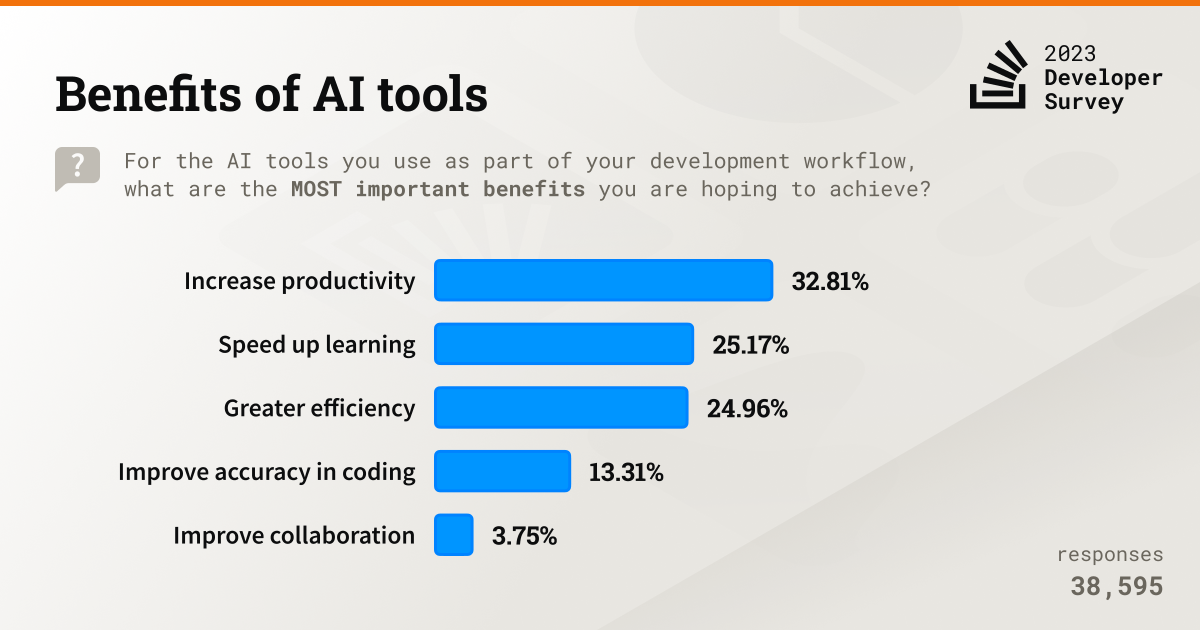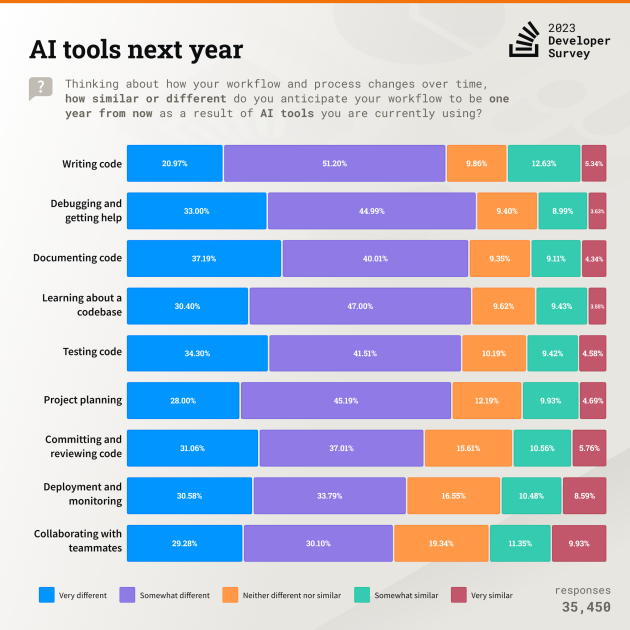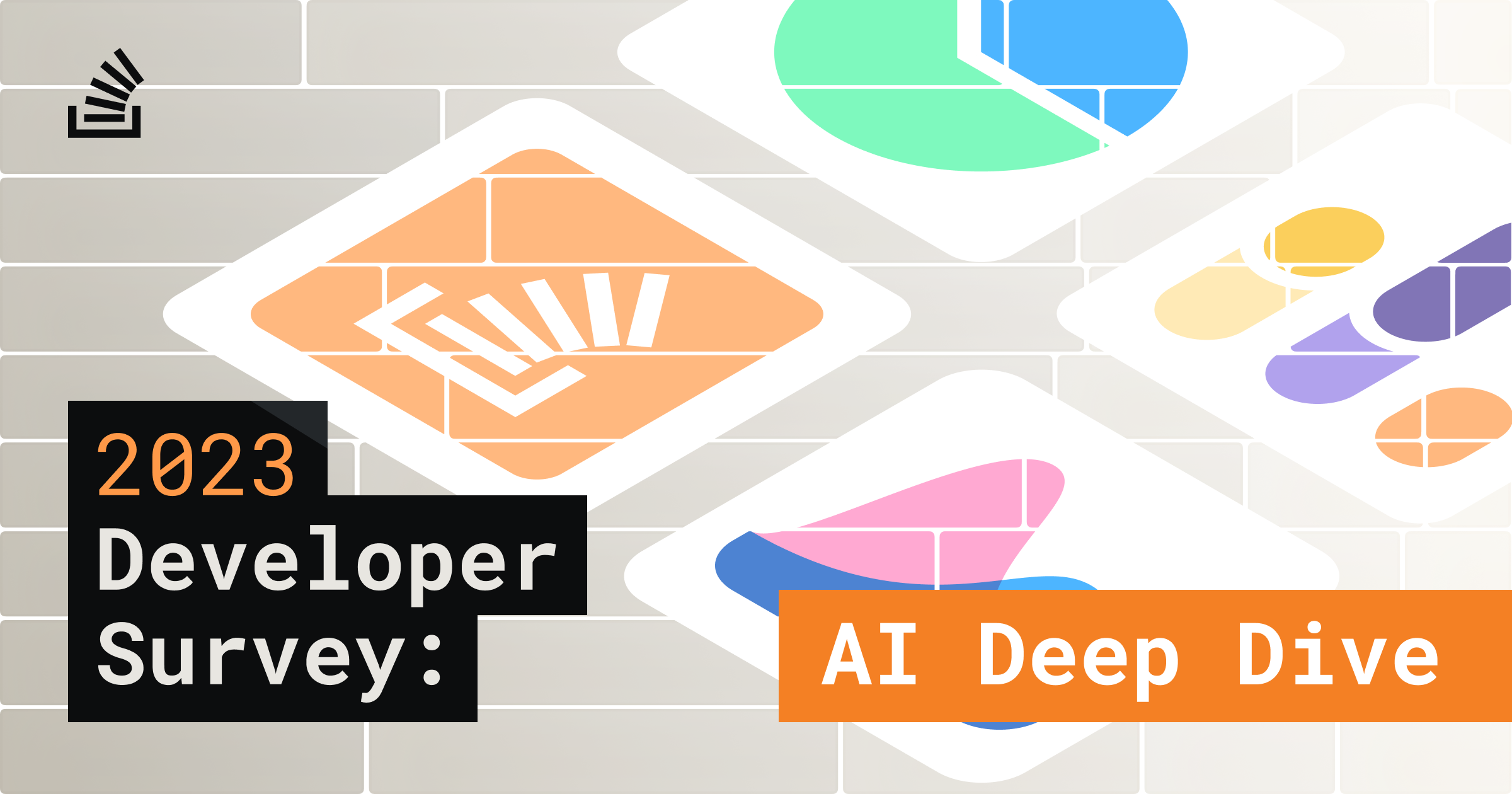For this year’s developer survey, we added new questions to gain insight into the real sentiments behind this year’s surge in AI popularity. Is AI making a real impact in the way developers work or is it all hype? This article will recap some of the top insights, but check out Stack Overflow Labs for the deep dive details.
Down the rabbit hole we go: Do professionals trust AI?
The reality is that developers are already using AI. 44% of them use AI tools in their development process now, and 26% plan to soon. Even more of those learning to code (55%) are currently using AI tools, and these early adopters will become established AI users once they settle into a professional developer position.
While a growing number of developers are using AI tools, they aren’t using a wide variety. We asked developers which tools they were using, and out of the 21 options we listed this year, a vast majority are just using the two popular products: ChatGPT (83%) and GitHub Copilot (56%). Professional developers may need time to adjust existing workflows, and will most likely be motivated by their junior colleagues who are using AI tools while learning to code.
It’s early days in the hype cycle for these newer AI technologies. We expect that a little more time may need to pass before we see developers using more AI tools more broadly. Another factor that may be contributing to the slow adoption of AI tools into the development process is that professional developers don’t highly trust the accuracy of AI tools. Of those using or planning to use AI tools, only 3% highly trust the accuracy they provide, and twice as many (6%) highly distrust them. While the majority (39%) are somewhat trusting of AI tools, this response tells us that AI tools still need to prove their usefulness.

When it comes to important matters like school or work, these new tools are not an easy button, and the axiom “trust but verify” is most likely the best approach to integrating new tools in the development process. On the AI Stack Exchange site, one of the most-visited questions so far this year is “Why is ChatGPT bad at math?” The question deals with the inability of AI tools, specifically those trained on large language models, to understand complex questions. But people get these sorts of problems wrong regularly, as well.
Where you are currently working also has an impact on whether or not you are using AI tools. Professional developers from India, Brazil, and Poland are most likely to use or plan on using AI tools as part of their development workflow—all responding at 70% or higher. UK, French, US, and German developers are more likely to say they don’t plan on using AI tools (responding at 36% or higher). A lot of new tech talent is being sourced from India and Brazil, a trend inferred from the large number of young developers in high salary-growth positions as reported in past developer surveys, so more prevalent use of AI tools in these regions makes sense.
Why would the EU countries and the US be more likely to report resistance to AI tools? Recent news has highlighted the possibility of imminent EU regulations for AI via pre-existing GDPR laws, and France has already begun investigating complaints against ChatGPT. In the US, no regulations currently exist, but companies are beginning to publicize their policies for banning ChatGPT at work, while Stack Overflow and Reddit have also publicly stated that they will start charging for data access to protect the attribution and contributions of their communities. Accuracy concerns and rules, whether legal or in the workplace, are keeping developers from rapidly adopting some AI tools.
Curiouser and curiouser: Why use AI tools at all?
Regardless of current use and intentions to use later, developers are positive about the possibilities. Most feel favorable (77%) towards using AI tools as part of their development workflow—but we do see some differences between groups. Blockchain developers, data scientists, and front-end or fullstack developers are more likely to be using AI tools now. Embedded application developers, desktop/enterprise developers, and hardware engineers are less likely to be using these tools and less inclined to use them in the future.
AI has a complexity cliff. Much like Helmsman’s complexity cliff, a concept found in project management, after a certain point, the ability for AI to handle all the nuances and interdependencies of a solution drops off. That’s when humans, their adaptability to apply judgment and have original thought, saves the day.
Out of all the developer roles who have a favorable view of AI tools, senior executives top the list (63%) alongside data scientists and blockchain developers. Developers working in data science and blockchain using AI makes sense: they are well-versed in this type of technology. It makes even more sense when we see the response to our question about what use cases developers have for AI tools they’re using today. The overwhelming majority use AI tools to write code (83%) or debug code (49%). We’d expect hardware engineers not to use AI for now, given their low confidence in these tools’ accuracy and the hands-on aspects of their job. When we asked developers about the benefits of AI tools, 33% believe increasing productivity is the most important benefit. Senior executives that do not have direct experience with these use cases may be in positions to see their colleagues’ explorations with productivity around writing and/or debugging code and want to try it out within their team or share amongst other people managers.

We asked developers how they thought AI tools would evolve their workflow over the next year, and 77% feel that the next year will look somewhat or very different for writing code with AI, and 75% feel the same about debugging code with AI. Updating the tools and evolving the learning curve will likely benefit those currently using AI tools or planning to soon.

The age of AI-integrated development is still in its infancy, but developers around the world have let us know that they are actively engaged, curious, and not looking away. Make sure to check out all the wonderful details at Stack Overflow Labs!
